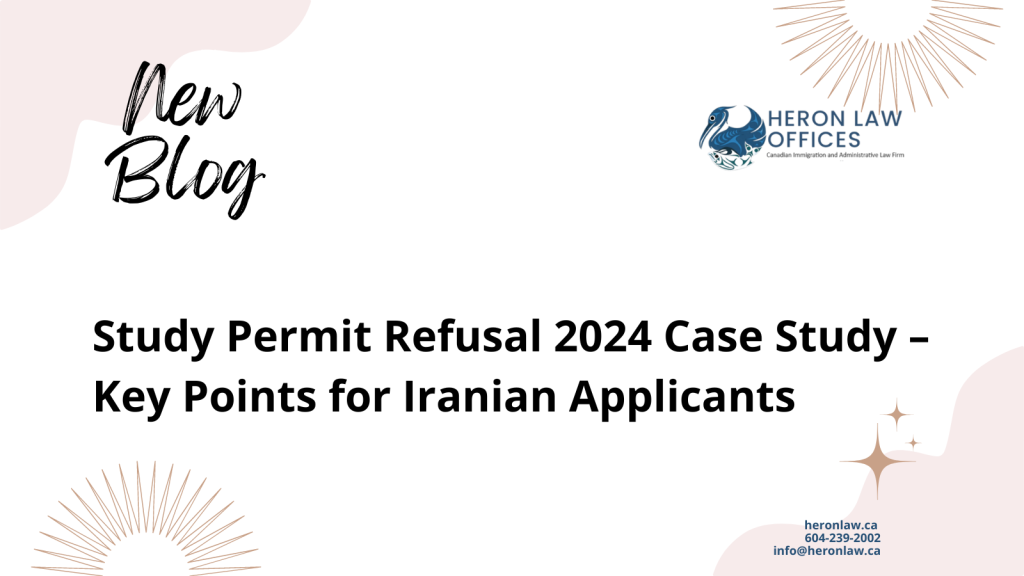

I will explore the reasons behind this high rate of refusal for Iranian applicants in a future blog. However, for now, let us discuss how you can submit a stronger study permit application to improve your chances of success.
Remember, this blog is not legal advice and should not be considered as such. Each applicant has a unique situation that is best assessed by a Canadian immigration lawyer.
This blog is part of a series in which I will review 2024 Iranian study permit refusals, focusing on issues such as financial reasons, ties, study plans, or the purpose of travel. We will examine how applicants can better address these issues when applying for a study permit.
Study Permit Requirements: Admissibility and Eligibility
To issue a study permit, a Canadian immigration officer evaluates both the applicant’s admissibility to enter Canada and their eligibility for a study permit. Admissibility assessments involve security checks, criminal history, human rights violations, prior non-compliance with Canadian immigration laws, medical concerns, and similar factors. These admissibility matters will be covered in future blogs.
This series focuses on eligibility for study permits. To be eligible, applicants must demonstrate that they have sufficient financial resources and that they will leave Canada by the end of their authorized stay. Many study permit refusals are based on one of these two categories.
Financial Reasons for Refusal
Under section 220 of the Immigration and Refugee Protection Regulations (IRPR, s.220), an officer shall not issue a study permit unless the applicant proves that they have sufficient and available financial resources, without working in Canada, to:
- pay tuition and fees;
- maintain themselves and accompanying family members;
- and pay the costs of transport for themselves and accompanying family members to and from Canada.
One of the primary financial reasons for the recent refusal of Iranian study permit applications is the failure to provide a six-month transaction history of the applicant’s bank account.
Not Providing a Six-month Transaction History
The IRCC website lists the required documents to demonstrate financial support (IRCC – Proof of Financial Support ). Additionally, visa office instructions specific to each country must be followed (IRCC – Other Documents). As Canada does not have an embassy in Iran, Iranian applicants must refer to the Ankara Visa Office Instructions (Link). These instructions require the following financial documents:
- Copies of bank statements or bank books covering the past six months,
- Proof of assets, such as real estate, investments, or other forms of income,
- If a person or organization outside Canada is funding the applicant’s studies, a detailed explanation letter and proof of financial capacity from the sponsor, and
- If a host in Canada is funding the applicant’s expenses, a detailed explanation letter from the host, proof of their income, and evidence of their legal status in Canada.
A common reason for the refusal of Iranian study permit applications is the failure to provide the first item: six months’ worth of bank statements or transaction history.
Challenges Faced by Iranian Applicants
Iran has been grappling with severe financial issues for decades, including a high inflation rate—44.6% in 2023 compared to Canada’s 3.9% (WorldBank). As a result, many Iranian applicants are reluctant to deposit their funds into bank accounts for an extended period, such as six months. Moreover, applicants must maintain their eligibility even after submitting their application, as an officer may request updated bank statements during processing. Given Iran’s inflation rate, keeping money in a bank for six months poses a significant financial risk.
In the recent case of Samavatian v. Canada (Citizenship and Immigration), 2024 FC 1385 (Samavatian), the officer’s reasons for refusing the study permit application were as follows:
“I note multiple property deeds and titles are provided, however, no banking transaction history to show regular intervals of deposits into the applicant’s accounts from said properties. Bank balance statements provided; large balances noted, no transaction history. I have concerns that the property documents are for demonstration purposes only and are not reflective of the applicants [sic] legitimate financial resources. Taking this into account, alongside the applicant’s plan of studies into account [sic] and banking records provided, I find the applicant’s financial situation does not demonstrate that funds would be sufficient or available for tuition, living expenses and travel. I am not satisfied that the proposed studies would be a reasonable expense (at para 6).”

In another case, Moradian v. Canada (Citizenship and Immigration), 2024 FC 1343 (Moradian), the officer refusing the study permit application stated:
“The applicant’s assets and financial situation are insufficient to support the stated purpose of travel for the applicant. Financial documentation provided shows only the balance, there is no evidence on file to demonstrate the history of fund accumulation, therefore I have concerns that the funds are sufficient or available for the intended studies in Canada (para 4).”
In Bayeh v. Canada (Citizenship and Immigration), 2024 FC 1321, (Bayeh), the officer refused the study permit application as the officer was not satisfied that the applicants would depart at the end of their authorized stay, finding, among other reasons, that insufficient evidence of the source of her funds had been provided. In particular, the officer explained that two specific bank statements did not include transaction records to track the provenance of available funds (para 1).
In many other similar cases such as Janaghaei v. Canada (Citizenship and Immigration), 2024 FC 1289, (Jahanaghaei), Kamali Kermani v. Canada (Citizenship and Immigration) – 2024 FC 1251 (Kamali Kermani), and Hendabadi v. Canada (Citizenship and Immigration), 2024 FC 987, (Hendabadi), the officer refused the study permit applications for various reasons including that the applicant did not provide 6-month transaction history for their bank account.
The Federal Court, in all the mentioned cases, dismissed the application for judicial review by referring to the Ankara Instructions and that the officers’ decisions were reasonable. In Hendabadi, for example, the court highlighted the Ankara Instructions for Iranian applicants. It held that the onus is on an applicant to ensure that there is sufficient information before the visa officer to assess their application. Visa officers are not required to further investigate or provide an opportunity for applicants to clarify their application or provide additional information to supplement their application (para 27).
Takeaways
1- Follow Country-Specific Instructions: While the IRCC website outlines general study permit requirements, it is essential to check the visa office instructions for your country. For Iranian applicants, the checklist explicitly requires a six-month transaction history of their or their sponsor’s bank account.
2- Mitigate Inflation Risks: If you are concerned about the devaluation of your money due to Iran’s high inflation rate, consider opening a US dollar account in Iran, which is a common practice. In Taghavi v. Canada (Citizenship and Immigration), 2024 FC 1078 (Taghavi), the officer refused an Iranian citizen’s study permit application for not providing a 6-month transaction history. The Federal Court granted the application for judicial review and set aside the officer’s decision as the applicant had deposited his funds in a US dollars personal account in an Iranian bank and clearly explained this issue in his application that the purpose of opening this account was for the costs of his studies and that due to the inflation rate in Iran, he chose to use that new account which did not have any other transaction, except for the initial deposit of the funds (para 10-19).
3- Provide Clear Explanation: Always provide a detailed explanation of your financial situation in your application. If you recently opened your bank account or your transaction history shows large deposits, explain the reasons for these circumstances and provide authentic supporting evidence that you have, such as real estate sales or other asset liquidation.
In the next blog of this series, I will discuss cases involving large lump-sum deposits to help you better understand how to manage this issue.
Stay tuned and contact us if you need help with your application!



